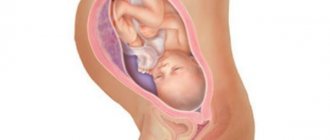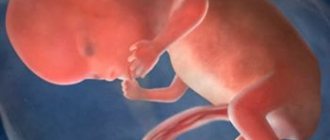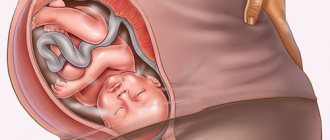All articles by the author
Author of the article: Ekaterina Sergeevna Churaeva
Practicing obstetrician-gynecologist, ultrasound diagnostics doctor
Vitamin E (tocopherol) during pregnancy, in the first weeks and preparation for it, is prescribed according to indications and under the supervision of a specialist. Like all vitamin preparations, it is an active biological substance, the effect of which on the human body has not been fully studied. Let's consider the biological role of tocopherol, the possibility and necessity of its use by pregnant women.
Why are tocopherols prescribed?
Tocopherols are preparations of fat-soluble vitamin E, available in various forms:
- oral solution in bottles with a capacity of 10 to 50 ml (300 mg/ml, 100 mg/ml, 50 mg/ml);
- capsules with variable dosage of tocopherol acetate.
Why vitamin E is prescribed during pregnancy, if during gestation all medications act on the fetus, it becomes clear after studying its properties on the cells of the body.
Tocopherol acetate is involved in metabolic respiratory cellular processes, protects red blood cells from premature destruction, strengthens the smallest blood vessels, and is an antioxidant.
Vitamin E during early pregnancy is indicated when the amount of this substance in the body is reduced (tocopherol hypovitaminosis). It is used for diseases of muscles (dystrophy, myopathy), ligaments and joints. Vitamin E, in order to get pregnant, according to medical protocols, is not prescribed without proper indications due to the risk of negative effects.
Why take vitamin E during pregnancy?
Taking microelements during pregnancy is an important factor. It not only helps secure the fertilized egg in the uterus, but is also responsible for the proper maturation and formation of the placenta. Prevents the placenta from aging and exfoliating early. It also helps produce good blood flow between mother and fetus. In the body of a pregnant woman, during the period of taking microelements, a hormone is synthesized, which after childbirth ensures an influx of breast milk to feed the baby after childbirth. While carrying a child, beneficial microelements fight such troubles as:
- weakness in muscle tissue;
- anemia;
- decreased immunity;
- formation of stretch marks on the skin of the abdomen, chest and thighs.
How to take when planning pregnancy?
Expectant mothers who competently plan conception and pregnancy turn to gynecologists for help. Prescribing vitamin E before pregnancy is not a mandatory measure that increases the chances of conception. For these purposes, doctors use special hormonal therapy regimens. When planning pregnancy, vitamin E is applicable for cycle disorders, that is, irregular, painful, heavy or scanty menstruation. In such cases, the vitamin preparation is not the main drug, but helps as part of a combined course of treatment.
Any medications can be used only after consulting a doctor
Does it help with conception?
It is justified to prescribe vitamin E for conception in cases of hypovitaminosis, which manifests itself as disturbances at the level of the cell membranes of all organs and tissues and can lead to infertility. When it is established that there is insufficiency of tocopherol in the body, a gynecologist will tell you how to take it for women to conceive.
Effects of a vitamin product on the reproductive system of women of childbearing age:
- antioxidant, that is, antioxidant effect on the cells of the reproductive organs, protecting them from aging and malignant degeneration;
- regulation of the menstrual cycle in case of disorders;
- due to control over protein synthesis, it has a positive effect on the formation of gonadotropic hormones in the pituitary gland, which are responsible for sexual function.
Dosage
You should not use the drug on your own, so as not to cause an increase in tocopherol in the blood. Your gynecologist will tell you how to take vitamin E when planning a pregnancy at your appointment, if it is really necessary for your health and conception.
Women without pathologies and without a history of miscarriages can take 10 mg per day as a preventive measure. Most often, multivitamins are prescribed, since it is more convenient than measuring drops and will provide a complex of effects. The dosage of vitamin E when planning pregnancy for women with miscarriage can be increased after consultation with a gynecologist.
It should be noted that vitamin E should not be prescribed at all for women planning pregnancy in cases where there are no indications for taking the medication. This substance should be supplied with a complete balanced diet. Tocopherol is found in large quantities in the following products:
- vegetable oils (sunflower, wheat germ oil, corn, olive);
- nuts (almonds, pine nuts, hazelnuts, peanuts, Brazil nuts, cashews);
- wheat bran;
- sea fish, caviar, cod liver, shellfish;
- sunflower and pumpkin seeds;
- chicken eggs.
How long to drink?
How much vitamin E to take when planning pregnancy depends on the pathology for which the drug was prescribed. Hypovitaminosis requires treatment until tocopherol is completely replenished in the body.
When planning pregnancy, vitamin E is used in minimal dosages for one to three months. Food products containing fat-soluble vitamins should be on the table of any woman every day.
Features of use and contraindications
The reaction to tocopherol is individual. Expectant mothers with a history of allergies should start taking vitamin E with minimal doses, gradually increasing them in the absence of undesirable reactions (rash, itching, swelling of the mucous membranes).
In addition, there are features that need to be taken into account:
- tocopherol is incompatible with iron supplements. At least 8 hours should pass between their doses. The same rule applies to nutrition: it is better to eat foods rich in vitamin E in the morning, and foods rich in iron in the evening, or vice versa;
- in the third trimester, it is able to increase the elasticity of the muscle tissue of the uterus and the likelihood of premature birth;
- the substance is much better absorbed with fats;
- Synthetic vitamin E is not completely absorbed in the body.
Vitamin E is fat soluble. For better absorption, the menu should contain vegetable oils (linseed, sunflower, corn)
Tocopherol preparations are not prescribed for the following conditions:
- chronic cholecystitis;
- biliary dyskinesia;
- increased thyroid function;
- lack of vitamin K in the body;
- pronounced heart failure.
When taking tocopherol, you need to take into account that it also enters the body with food. Therefore, as prescribed by a doctor, the daily dose of synthetic vitamin E is sometimes lower than the maximum allowable for expectant mothers.
Should pregnant women take this vitamin?
Vitamin E for pregnant women is prescribed in the following cases:
- miscarriage of previous pregnancies, when there were spontaneous abortions up to 13 weeks;
- the occurrence of a frozen pregnancy in the past, when the embryo stops growing and developing;
- violations of the formation of the child’s systems during previous pregnancies;
- threats of early miscarriage;
- risk of impaired formation of embryonic systems.
Whether it is possible to drink vitamin E during pregnancy is decided only by the gynecologist caring for the expectant mother or the doctor of the hospital where the woman was admitted with problems with pregnancy.
For what period?
Tocopherol acetate in therapeutic doses and for prophylaxis is prescribed in the first trimester, that is, up to the 13th week of gestation. This is due to the fact that in later stages this vitamin can adversely affect the fetus and lead to premature birth or bleeding. Whether to drink vitamin E during pregnancy in the first trimester or whether only food rich in tocopherol is enough depends on its amount in the blood serum.
Doses
The amount of tocopherol depends on the pathological process for which it is used. How much to drink during pregnancy is prescribed only by a doctor.
Doses for therapeutic purposes:
- in case of threatened miscarriage in the first months of pregnancy, we use 100 mg in the form of capsules or solution for internal use;
- for repeated miscarriages in the early stages, 0.1-0.3 g per day.
- in case of problematic intrauterine development of a child, doses from 0.1 to 0.15 grams are applicable.
How to use?
Vitamin E for pregnant women is indicated for use in the first trimester. In certain conditions, treatment periods may differ:
- if there is a risk of self-interruption, the treatment lasts 7-14 days;
- if there have been miscarriages in the past, the vitamin is prescribed during the first trimester;
- with intrauterine delays during the first 2-3 months of gestation.
Successful conception: vitamin E during pregnancy planning
It is necessary to start taking the drug even before conception occurs. This is especially important for couples who have already had miscarriages or have problems with fertilization.
Another name for vitamin E is tocopherol, which in Greek means “bringing offspring.”
In this case, the doctor prescribes the drug to both partners who want to have offspring. For a woman, vitamin E plays the following role:
- supports hormonal levels;
- controls the process of egg maturation;
- promotes ovulation;
- responsible for the attachment of the fertilized egg in the uterus.
Many men are perplexed as to why they need to take this remedy. The thing is that tocopherol has the ability to improve the quality of seminal fluid.
Taking the drug will have the following effect:
- improves the quality of seminal fluid;
- will increase sperm activity;
- will reduce the number of sperm with pathological changes for the birth of stronger offspring.
The drug is also an excellent antioxidant and will help remove waste and toxins from the body. The dosage in this case for each partner can be individual, taking into account age, weight and characteristics of the body.
Other vitamins during pregnancy
Expectant mothers are prescribed vitamin preparations as part of complexes and individual preparations. The use of vitamin supplements is necessary for the proper formation of all structures of the unborn baby, the normal course of pregnancy, increased immunity and the healthy functioning of a woman’s systems. They should be prescribed by a doctor, taking into account tolerability, possible allergic reactions, gestational age, concomitant pathologies and compatibility with other medications.
Folic acid (B9)
Folic acid is a B vitamin, synthesized by bacterial flora in the intestines and helps in the formation of blood cells. When planning pregnancy, vitamin B9 should be taken in a monthly course and continued intake during the first trimester of pregnancy. The medicine is prescribed at a dose of 400 mcg per day.
Folic acid is necessary to prevent the occurrence of serious malformations of the nervous system of the unborn child. Neural tube defects (anencephaly, spina bifida) are incompatible with life and lead to early miscarriages, so taking a vitamin preparation is included in the mandatory list of recommendations.
Cholecalciferol (D)
Vitamin D should be taken during pregnancy, like vitamin E, strictly according to indications. A medicinal substance is prescribed for the treatment of hypovitaminosis D, spasmophilia, rickets-like pathologies, osteomalacia and hypocalcemic tetany. Excess vitamin D in a woman’s body can lead to dyspeptic symptoms, weakness, impaired kidney function, and increased calcium in the blood. In addition, an overdose during pregnancy can negatively affect the unborn child.
Overdose
If you do not exceed the recommended daily intake of this vitamin, then adverse reactions will not occur. Have you overdosed? This may cause visual disturbances, dizziness, nausea or abdominal cramps, extreme fatigue or weakness.
High doses may cause an increased risk of bleeding in patients with vitamin K deficiency, impaired metabolism of thyroid hormones, increased risk of thrombophlebitis or thromboembolism in sensitive patients, increased cholesterol, triglycerides, estrogens or androgens.
Tocopherol can be deposited in layers of fat (and a pregnant woman has plenty of them), in the liver. If an overdose occurs, pathologies of the fetus, disorders of the nervous system in the mother, or hypofunction of the kidneys and liver may occur.
For pregnant women, it is important to follow the dosage. This is especially important in the early stages. If you take tocopherol without control, an overdose is possible. To accumulate tocopherol, you need to take three capsules daily throughout the entire period of gestation or take 5-10 capsules instead of one or two in the 1st trimester of pregnancy. The dosage of vitamin E during pregnancy is always higher, especially in the first months, when the baby’s body is still developing.
Vitamin E preparations for pregnant women
Modern pharmacology provides a wide selection of medicines to solve many health problems. Even vitamins are produced taking into account gender, age and other indicators.
Table: popular drugs with tocopherol recommended for use by pregnant women
| Name | Dosage form | Compound | Contraindications | Features of use during pregnancy | Packaging cost |
| Vitamin E capsules | Gelatin capsules with liquid contents. |
| Thyrotoxicosis and individual intolerance. | 100–200 mg per day, with breakfast or lunch. The duration of the course is determined by the attending physician. | From 68 rubles (depending on the manufacturer). |
| Aevit | Gelatin capsules with liquid contents. |
|
| In the first trimester, it should be used with caution and only as prescribed by a doctor in the amount recommended by him. | From 14 rubles (depending on the number of pieces in the package). |
| Vitamin E Zentiva | Gelatin capsules with liquid contents. |
| Should be taken with caution
| Only as prescribed by a doctor, in the second trimester, 1-2 capsules per day. | From 261 rubles. |
| Biovital | Round biconvex dragees |
|
| The dragees are swallowed without chewing. The dosage and duration of therapy is determined by the doctor. | From 250 rubles. |
| Elevit Pronatal | Oblong-shaped tablets, film-coated. |
|
| Relatively low doses of components allow you to take the complex throughout pregnancy, 1 tablet per day. | From 700 rubles. |
Table: foods with the highest vitamin E content
| Product | Vitamin E content (mg per 100 g of product). |
| Wheat germ oil | 49.4 |
| Almond oil | 39 |
| Roasted sunflower seeds | 36.3 |
| Cottonseed oil | 35.3 |
| Almonds, nuts | 30.8 |
| Peanut | 10.3 |
| Egg | 10.1 |
| Dried apricots | 5.5 |
| Olives | 5.0 |
| Sea buckthorn | 5.0 |
| Granular caviar | 4.0 |
| Rose hip | 3.8 |
| Wholemeal bread | 3.8 |
| Chocolate | 2.9 |
| Liver | 1.3 |
| Flounder, herring | 1.2 |
| Beef meat | 0.57 |
Video: where to look for natural sources of vitamin E
Tocopherol in products
Natural tocopherol is absorbed in the body better than synthetic one. You can get it from food. There is a lot of vitamin E in vegetable oils (wheat germ, corn, sunflower, flaxseed), nuts, and seeds.
They are also rich in:
- sprouted wheat grains and nettle leaves;
- wholemeal flour and bread made from it;
- rose hips and sea buckthorn fruits;
- buckwheat grain;
- peas and beans;
- cabbage and greens (green onions, asparagus);
- spinach;
- butter;
- beef liver;
- fish;
- vegetables and fruits;
- chicken eggs.
The menu should be designed in such a way that you get the necessary vitamins and minerals every day without gaining excess weight. It is better to eat more products of plant origin - vitamin E is mainly present in them.
Photo gallery: which products contain tocopherol
Sprouted wheat grains are rich not only in tocopherol - they are valuable as a source of many vitamins and minerals
You can make borscht and salads from nettle leaves.
Wholemeal flour (products made from it) improves intestinal motility and helps cleanse the body
Rosehip tea relieves swelling and strengthens the immune system
Buckwheat is one of the most valuable grains in terms of vitamins and minerals.
Legumes include peas (green and dried), beans, beans, lentils
A lot of vitamin E is found in cabbage (broccoli, cabbage, Brussels sprouts)
Green onions are often used in salads and as an addition to meat and vegetable dishes.
The benefits of asparagus lie in its rich composition.
Spinach has a neutral taste and is equally good in salads and soups.
Dairy products and eggs contain a large amount of nutrients
Fresh vegetables and fruits should be the main dish on the table
Fresh sea buckthorn berries are an excellent way to get rid of spring vitamin deficiency.
Table: vitamin E content in food
| Product | Vitamin E content per 100 g, mg |
| Wheat germ oil | 215,4 |
| Corn oil | 93 |
| Sunflower oil | 67 |
| Flaxseed oil | 57 |
| Hazelnut | 26,6 |
| Almond | 25,2 |
| Sunflower seeds | 21,8 |
| Walnuts | 20,8 |
| Peanut | 19,4 |
| Buckwheat | 6,6 |
| Peas | 5,1 |
| Beans | 3,8 |
| Cabbage | 3,6 |
| Flour, cereals, bread | 3 |
| Green peas | 2,5 |
| Butter | 2,2 |
| Buckwheat flour | 2,1 |
| Eggs | 2 |
| Asparagus | 1,5 |
| Liver | 1,3 |
| Green onions, apricots, peaches | 1,2 |
| Fish | 0,6 |
| Vegetables, fruits, berries | 0,5 |
| Dairy | 0,3 |
| Meat | 0,3 |
Remember: there are no natural vitamins on the modern pharmaceutical market - all preparations, without exception, contain only the active parts of vitamins or their analogues obtained synthetically. Natural vitamins are found only in food.
Berezovskaya E.P., doctor-researcher, author of books on women's health
https://lib.komarovskiy.net/vitaminy-i-beremennost.html
Rules for taking tocopherol in early pregnancy
To get the maximum benefit from the vitamin, pregnant women need to know how, in what form and in what doses to take it.
In the first trimester of pregnancy, doctors very often prescribe tocopherol in capsule form. They are taken during meals, since the vitamin is perfectly absorbed in symbiosis with fats. The dosage of the drug and duration of administration are prescribed exclusively by the attending physician. On average, the daily requirement of the vitamin is about 20 mg, but depending on the course of pregnancy and the individual characteristics of the female body, it can be adjusted by a doctor.
In the second and third trimesters of pregnancy, it is not necessary to take a capsule vitamin, because during these periods, multivitamin preparations that contain vitamin E are prescribed.
Don’t forget about food products that contain sufficient amounts of tocopherol.
It is very important that a pregnant woman’s menu includes:
- vegetable oils (unrefined);
- milk products;
- liver;
- wheat sprouts;
- bran;
- fruits and vegetables (especially peach, mango, avocado, broccoli, spinach);
- egg yolk;
- seeds and nuts;
- cereals: buckwheat, oatmeal, brown rice;
- sea buckthorn and rose hips.
You can also replenish your vitamin reserve with a herbal decoction made from raspberry leaves. You can also take a mixture of vegetable oils: cedar, sunflower and olive.
However, do not forget that all traditional methods of fortification must be discussed with a specialist.
Vitamin danger
There is a lot of controversial talk about the usefulness of vitamin E and its overdose during pregnancy. And this is not surprising, because with all the advantages, tocopherol, as a fat-soluble vitamin, has the peculiarity of being deposited in the liver and fatty layers, and, as you know, during nine months of pregnancy a lot of them appear in a woman’s body. In addition, an excess of this element increases muscle elasticity, and this can create difficulties during labor.
An overdose of vitamin E negatively affects the well-being of the expectant mother and the development of the child. An excess of tocopherol can provoke:
- congenital pathologies of fetal development;
- maternal nervous disorders;
- problems with the renal system and liver of a pregnant woman.
However, you should not focus your attention on all of the above factors and stop taking the vitamin. As for the accumulation of tocopherol in the female body, this is only possible when taking 10 capsules instead of the prescribed three per day or with long-term use of the vitamin, that is, throughout the entire period of pregnancy
Therefore, you should not worry about this, you just need to consult with your doctor and discuss with him the dosage and duration of vitamin therapy. But you shouldn’t give up this invaluable and necessary vitamin, especially in the early stages of pregnancy, since its deficiency can cause serious problems and even the threat of miscarriage.
Compliance with all medical recommendations and full control over your diet will allow you to get the maximum benefit from this important element. It’s not without reason that when translated from Greek, the first half of the name of the vitamin “tokos” means “birth”, and the second half “ferro” means “to wear”
In other words, the main task of the vitamin is to bear a healthy and strong baby.
It is not without reason that when translated from Greek, the first half of the name of the vitamin “tokos” means “birth”, and the second half “ferro” means “to wear”. In other words, the main task of the vitamin is to bear a healthy and strong baby.
E or tocopherol
Vitamin E has the medical term tocopherol.
Translated from Greek, “tokos” means “birth”, and “ferro” means “to wear”. By combining the two parts, we get a completely natural result - it helps the birth, and, more simply, helps to carry the baby.
Most obstetricians and gynecologists agree: preparing the body for conception, pregnancy and childbirth should begin in advance, preferably at least 5-6 months before conception.
A woman needs to undergo an examination, check the level of hormones in the blood, and identify the presence of STDs.
A special place is occupied by a laboratory analysis called blood biochemistry. The expanded version will help identify the lack of essential substances and microelements that are vital for the full development of the child.
This is how it is determined how much E is contained in the body, and its daily dosage required in each specific case is determined.
Benefit
Vitamin E is essential and has a completely unique effect on a woman’s body during pregnancy:
Improves oxygen transport to all organs and tissues.
How important is this process?
The more oxygen the body of the mother and baby receives, the less chance there is of a condition in the fetus called hypoxia.
Specialists constantly monitor pregnant women, prescribing vitamin E, which reduces the risk of developing this pathology.
Helps reduce cramps that occur in the lower extremities.
Cramps are one of the very unpleasant signs that accompany the process of bearing a child.
The vitamin will significantly reduce the frequency and intensity of their occurrence.
Actively prevents thrombus formation.
The occurrence of blood clots is equally dangerous for both mother and child.
In some cases, there is increased formation of blood clots, which can lead to blockage of the placenta and death of the baby.
Takes part in the normalization of hormonal levels, creating favorable conditions for gestation.
The more stable a woman’s hormonal background is during pregnancy, the easier it is for her to bear a baby.
Improves the maturation of the placenta.
The maturity of the placenta, as well as the rate of its aging, determines how well the pregnancy proceeds.
Insufficient development or too rapid aging process are very significant reasons for concern and increased monitoring of the ongoing pregnancy.
Prevents placental abruption.
The process is the reason for placing the woman in a specialized medical institution for the purpose of constant monitoring. The doctor prescribes a set of measures, which include tocopherol in order to stabilize the condition.
Takes part in the production of the hormone prolactin.
The hormone is responsible for the preparation of the mammary glands, and subsequently stable lactation.
Then what are the concerns of some experts? Why have there been opponents of taking tocopherol, and what harm can it cause?
Harm
An excess of microelements can be no less harmful to a baby’s body than its deficiency.
Excessive use:
- leads to severe visual impairment,
- the process of platelet formation is disrupted.
It was this fact that caused concern among doctors.
However, if a woman fully follows the recommendations of the gynecologist leading the pregnancy, and all clinical studies are carried out in a timely manner, then taking tocopherol can only contribute to the normal course of pregnancy.
Are there signs indicating hypervitaminosis? Certainly!
- fast fatiguability,
- apathy,
- emerging digestive problems should alert a woman.
Tell your doctor about how you feel.
Only with constant monitoring can vitamin E be prescribed during pregnancy, since in this case the baby will need it and will not cause harm.
Where is it contained?
Along with synthetic analogues, there are other ways to obtain vitamin E.
A number of products contain fairly large amounts of tocopherol. Their use in food will help maintain the desired concentration of the microelement in the body.
- nuts,
- green vegetables,
- sprouted cereals,
- buckwheat,
- oatmeal,
- eggs,
- beans,
- liver.
Don't forget: proper and balanced nutrition during pregnancy will help you avoid taking synthetic drugs!
Excess and overdose of vitamin “E”
Overdose occurs very rarely. But it can cause itching and allergies. With long-term use in large dosages of tocopherol, headaches, nausea, enlarged liver, stomach bleeding, and weakness are possible.
If a pregnant woman takes the vitamin 400 mg per day for a very long time, then signs of dyspeptic disorder are possible. If any of the above symptoms appear in a pregnant woman, you should stop taking the drug and consult a doctor.
Many experts believe that an overdose of tocopherol can harm the unborn child. According to studies conducted by British scientists, it was found that high dosages of vitamin “E” can provoke oxygen starvation and heart pathologies in the fetus.
To minimize the possibility of an excess of vitamin E, you should be tested to determine its content before using the drug. You can take it not only in synthetic form, but also eat foods rich in this vitamin (nuts, eggs, buckwheat, rose hips, oatmeal).
Vitamin E during pregnancy
While carrying a baby, a woman should receive more vitamins and minerals than usual. They are necessary for the growing fetus and the expectant mother herself to avoid health problems.
Principle of action on the body
Vitamin E has the unique property of slowing down the aging of the body and launching rejuvenation processes, which has earned its second name - the vitamin of youth and beauty. The rejuvenating effect can be achieved thanks to a good supply of oxygen to the cells and ridding them of decay products.
Tissue regeneration is extremely important for the blood, skin, digestive tract, mucous membranes and respiratory tract, because constant cell renewal occurs there
There are several other important effects that tocopherol (vitamin E) has on the human body:
- prevents excessive formation of blood clots, reducing blood clotting, and is a preventive measure against blood stagnation in tissues and organs. Due to reduced coagulability, blood vessels do not become clogged and blood flows through them without interference. The condition of the walls of blood vessels also improves, they become smooth and cholesterol plaques do not manage to attach, which helps a lot in the prevention of atherosclerosis. Therefore, vitamin E helps to avoid heart and vascular failure;
- increases the body's resistance to infectious pathogens, improving the functioning of the immune system. Together with vitamin A, it protects the lungs from exposure to air containing harmful impurities;
- stops attacks of muscle cramps and accelerates the healing of burns and all kinds of wounds, and the scars do not remain on the skin at all or are hardly noticeable. Normalizes muscle tone, putting their performance in order;
- affects the production of hormones necessary to maintain the sexual and reproductive functions of the body. Tocopherol in women regulates blood supply to the uterus and ovaries, and during pregnancy it stimulates the synthesis of progesterone and helps the placenta form. Reduces the impact of premenstrual syndrome and increases the chance of complete cure of fibrous tumors in the mammary glands.
Regardless of a person’s gender, tocopherol helps lower blood pressure, expanding and strengthening the walls of blood vessels, and prevents the development of anemia and cataracts. Effectively helps normalize the functioning of the nervous system.
The name tocopherol comes from the merger of the Greek words “tokos” and “ferro”, which literally translates as “bringing procreation”.
The importance of vitamin E during pregnancy for the expectant mother and fetal development
Women bearing children are prescribed a course of vitamin E, because tocopherol:
- takes an active part in the production of hormones necessary for the period of bearing and breastfeeding a child to proceed without deviations;
- helps the fetus to fully develop, including the formation of the baby’s blood cells;
- has antioxidant properties;
- reduces the risk of premature resolution;
- regulates the functioning of the nervous system;
- protects the retina and muscle tissue from harmful effects.
Video: What you need to know about prenatal vitamins
Why is tocopherol deficiency dangerous for the expectant mother and fetus?
If your doctor recommends taking a course of vitamin E, be sure to follow the advice. A lack of tocopherol can lead to undesirable consequences:
- severe toxicosis in the first 12 weeks;
- miscarriage - spontaneous abortion in the early stages of pregnancy;
- increasing muscle pain;
- vision problems;
- the appearance of pigment spots on a woman’s body;
- poor coordination during movements or difficulty pronouncing words clearly (dysarthria);
- gradual death of liver cells;
- convulsions, increased blood pressure and swelling in the third trimester - obvious manifestations of late toxicosis;
- significant deterioration in the condition of hair, skin and nails;
- disruptions in the digestive system and sleep disorders;
- developmental delay of the fetus;
- insufficient milk production - hypolactation;
- placental abruption, which threatens the inevitable death of the child, or extremely premature birth, after which only a small percentage of newborns survive.
Vitamin E is fat-soluble and can only be absorbed by the body through fat-rich foods. Therefore, during pregnancy and at the planning stage, when taking tocopherol is also recommended, low-calorie diets are contraindicated.
During pregnancy, I was prescribed vitamin E twice, in addition to all the others in the complex. The first time was in the 11th week, when I almost fell twice within a week due to lack of coordination. I told the doctor, got tested and was prescribed gelatin capsules with tocopherol. And at the 19th week, the skin on the corners of my lips began to crack, after which the doctor again recommended the same capsules to me. Both times the dosage was the minimum allowed, so that the deficiency did not turn into excess. I heard that it is better to plan the conception of children in the fall, when the body is filled with vitamins received over the summer. I think I agree with this, based on my own experience of carrying a son conceived in the spring. For several years by that time, I was sure that it was not my destiny to become a mother, and pregnancy came as a surprise, albeit a pleasant one. The meager supply of vitamins after the winter months had to be replenished with medications, until the new harvest. And my sister, who became pregnant in October, only took Elevit Pronatal for the first three months and no additional vitamins or microelements were prescribed to her. The tests are good, we are expecting the birth of our nephew in a month. Still, it seems to me that natural vitamins are healthier than synthetic ones.
Multivitamins with tocopherol
During pregnancy, a woman needs all vitamins, minerals and nutrients in increased quantities. Buying every vitamin and mineral preparation is expensive and problematic; it is better to purchase a vitamin and mineral complex containing all useful compounds.
Today in pharmacies you can find many multivitamins suitable for pregnant women. Each complex necessarily includes vitamin E. Among the highest quality and most popular preparations we can note:
- Prenatal Nutrients by Solgar;
- Alphabet Mom's health;
- Complimentary Mom;
- Pregnavite;
- Emfetal;
- Vitrum Prenatal;
- Centrum Materna;
- Multi-tabs Perinatal;
- Femibion 1;
- Femibion 2;
- Elevit Pronatal.
Release forms and instructions for use
Tocopherol preparations are available in several forms:
- capsules - taken orally;
- injection solution - rarely prescribed to pregnant women, since the injections are very painful, they leave swelling and hardening;
- oil solution (ointment) - intended for external use for skin problems (peeling, stretch marks).
Vitamin E capsules are taken 1-2 times a day (depending on the doctor’s prescription) before or during meals. You can combine it with folic acid (vitamin B9), which is also very important in early pregnancy.
Table: tocopherol in capsules from different manufacturers
| Trade name and brand | Main differences |
| Vitamin E 400-Zentiva (or the more expensive analog Vitrum-400) | Contains the maximum dose of tocopherol. Prescribed for problems with conception, pregnancy, intrauterine development of the fetus. |
| Vitamin E 200-Zentiva | Contains 200 mg tocopherol. |
| Vitamin E 100-Zentiva | Contains a minimal dosage of tocopherol. |
| Lumi Aevit vitamin E + retinol | Multivitamin complex for pregnant women. Each capsule contains 100 mg of tocopherol. May cause allergies. |
| Alphabet Mom's health | Multivitamin complex. 1 tablet (blue) contains 12 mg of vitamin E. Recommended from the second trimester of pregnancy. |
| Elevit Pronatal | Multivitamin complex. 1 tablet contains 15 mg of tocopherol (for 1 dose). Appointed in the second half of the term. |
Contraindications for prescribing vitamin E to pregnant women and side effects
Tocopherol should not be taken if you are hypersensitive or after a heart attack. Considering that heart disease is often discovered in unsuspecting young women, you should never start taking vitamins on your own.
Among the side effects when taking tocopherol are the following:
- allergic reactions accompanied by itching and hyperemia (redness) of the skin;
- decreased blood clotting and bleeding in the gastrointestinal tract;
- liver enlargement;
- loss of strength, nausea, headache.
Doses of vitamin E are in most cases measured in the international unit - IU, which is equal to 0.67 mg of tocopherol
Interaction with other drugs
You should not take medications containing vitamin E together with the following medications:
- containing iron and silver due to the incompatibility of these elements;
- giving an alkaline reaction (for example, sodium bicarbonate);
- reducing blood clotting.
Tocopherol interacts well with the following medications:
- enhances the effect of using anti-inflammatory drugs based on hormones synthesized by the adrenal glands - diclofenac, prednisolone and ibuprofen;
- reduces the unwanted toxic effects on the body of glycosides - plant substances that support normal heart function - digitoxin, vitamins A and D.
Video: signs of vitamin E deficiency in people
Overdose of tocopherol during pregnancy
To get an overdose of vitamin E, you need to try harder. Strict adherence to the doctor’s recommendations, even in combination with vitamins entering the body from food, helps to avoid their excess. But if an overdose does occur, treatment is prescribed by a doctor based on examination and tests. Therapy is usually aimed at eliminating symptoms.
To prevent overdose, buy vitamins on the advice of a doctor, and not under the impression of advertising, and strictly follow the recommended dosage
Consequences of tocopherol overdose for mother and child:
- increase in body weight and mass fraction of fat in tissues. Fat-containing products have the ability to remain with a person for a long time in the form of deposits on the sides, which is extremely undesirable for pregnant women. After all, excess weight makes labor weaker;
- excess vitamin E can cause congenital deformities and pathologies of internal organs in a child;
- hypervitaminosis can provoke premature birth, as it increases muscle tone, including the uterus. Therefore, taking medications containing tocopherol is contraindicated in the third trimester;
- Most often, exceeding the norm leads to disruptions in the nervous and digestive systems, and disrupts the functions of the kidneys and liver.
In my opinion, expectant mothers should take medical advice seriously to avoid vitamin deficiency or excess. You should not skip doses and then take a double dose at one time. If a woman is prone to forgetfulness, you can do as I did - set an alarm clock for the time of the next appointment, and to be on the safe side, ask someone close to you to remind you. My mother called me.
The importance of tocopherol for the expectant mother and baby, dosage regimen
Tocopherol is the most important component when carrying a baby. Its positive impact is as follows:
- prevention of fetal hypoxia - tocopherol ensures the supply of oxygen to the child’s body in sufficient quantities, helps to avoid hypoxia - a very dangerous condition leading to the development of pathologies;
- formation of a healthy placenta - vitamin E is necessary for the placenta, the condition of which directly affects the health of the baby, it protects it from aging and detachment;
- normalization of hormonal levels - tocopherol promotes the production of the required amount of important hormones, thereby maintaining hormonal balance and ensuring a successful pregnancy;
- protection of blood vessels - the vitamin increases the elasticity of blood vessels and prevents the formation of blood clots, and also significantly reduces the risk of leg cramps.
Vitamin E for pregnant women
The positive effect of taking vitamin E during pregnancy is achieved only if the prescribed dosage regimen is followed. The benefits of tocopherol for the expectant mother are obvious, but it should only be taken under the supervision of a doctor. Uncontrolled use of the drug can lead to the following negative consequences:
- allergic reactions;
- exceeding the permissible norm due to the accumulation of the substance in the body;
- increased uterine tone.
For pregnant women, tocopherol is mainly prescribed in capsules. In the first trimester, the dosage ranges from 200 to 400 mg. The number of capsules required for one dose, depending on the manufacturer, may vary. Some preparations contain 400 mg of the vitamin per capsule, others have a dosage of 100 or 200 mg. The daily dose of the drug is prescribed only by a doctor, depending on the weight of the expectant mother, test results and the general condition of the body.
Vitamin E is especially necessary during early pregnancy, for which it is prescribed to almost everyone, and in the second and third trimesters there is no need to take tocopherol in capsules, since multivitamins containing it are usually prescribed at this time. Together with ti-boginya-detka.ru we will consider popular vitamin complexes:
- Alphabet is a domestic product, has a thoughtful composition and contains the necessary doses of most important minerals and vitamins;
- Elevit Pronatal is a complex of vitamins developed for pregnant women. Its balanced composition includes the most important elements for the body of the expectant mother, as well as the growth and development of the baby;
- Aevit is a combination drug, the use of which compensates for the lack of vitamins A and E;
- Complivit Trimesterum is a domestic group of drugs that include complexes for use in each trimester.
Pregnancy vitamins are essential
Each of the complexes has its own contraindications, so only a doctor prescribes vitamin E during pregnancy.
The price of drugs depends on the manufacturer; as a rule, domestic products are cheaper. Taking tocopherol can be continued after the baby is born; it promotes faster recovery of the body and has a positive effect on the lactation process.
The beneficial vitamin is also found in a number of foods that the expectant mother can include in her diet. These include:
- vegetable oils (unrefined);
- milk;
- liver;
- bran;
- fruits and vegetables;
- seeds;
- nuts.
The benefits of vitamin E for the expectant mother and baby are obvious, but there are certain contraindications for its use, and an overdose can cause a number of negative consequences.
Correct dosage
Vitamin E has many beneficial properties, but overdose should not be allowed, especially during pregnancy. It is fat-soluble and tends to accumulate in adipose tissue cells. During pregnancy, adipose tissue begins to actively grow, which can lead to excessive accumulation of this vitamin in the body.
Tocopherol helps increase muscle elasticity, which can negatively affect the birth process. In this regard, they try not to prescribe it in the last trimester of pregnancy. You should adhere to the norm when consuming this vitamin, because exceeding it will not lead to a positive result, but will only worsen the situation. Many people are interested in how much E to drink when carrying a child.
International units - IU - are used to indicate the dosage of drugs. 1 IU is equal to 0.67 mg of tocopherol or 1 mg of tocopherol acetate.
Doctors often prescribe 200-400 mg of vitamin E per day to pregnant women. For each individual case, the dose may be different, and this is not a deviation from the norm. A dose of no more than 1000 mg per day is considered safe for health during pregnancy, exceeding which is prohibited. In rare cases, doctors prescribe tocopherol separately. Most often, the doctor selects an individual complex of vitamins, which contains a daily dose of tocopherol. When tocopherol is taken separately, it can be taken with food.
It should be noted that inorganic iron, when reacting with tocopherol, is significantly destroyed. In this regard, you should not take medications that contain iron along with vitamin E
It is recommended to consume boiled foods containing iron no earlier than 8-12 hours after taking tocopherol.
Importance of Tocopherol
Tocopherol, better known to us as vitamin E, is classified as a fat-soluble vitamin. It performs the following functions:
- antioxidant – neutralizes free radicals in the body;
- balances cell membranes;
- protects intracellular structures;
- promotes egg maturation;
- regulates the menstrual cycle;
- improves sexual function of women and men;
- controls the production of progesterone and estrogen.
The vitamin has a comprehensive beneficial effect on the reproductive system of women and men; it is even prescribed for the treatment of infertility.











